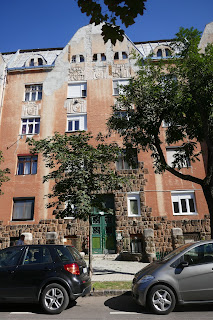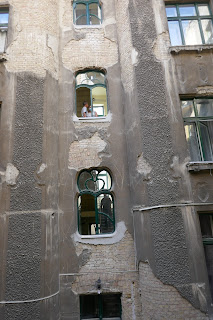I took against Seamus Heaney before I'd ever read a poem of his. The reason I took against him was because of a story told to me by someone I knew who somehow discovered his poems and became enthralled by them before he became famous. She decided to write a Ph D about him. I remember that happening, and I remember her subsequent excitement when, in reply to her tentative letter, asking Heaney a few questions, he wrote back, suggesting that she come to stay for a couple of weeks. She couldn't believe that he was willing to give her such an amazing opportunity. She said she would love to and set about making arrangements. Shortly afterwards, she travelled all the way from Australia to the remote place in Ireland where the poet lived.
When at last she got there, (after tramping across swamp and bog, falling into mudholes, nearly drowning, climbing mountains in Irish mist? - perhaps these details are my imagination providing baroque flourishes), she told me that she was greeted enthusiastically by Heaney and his wife who were already waiting beside the door with two suitcases. They introduced her to their children, showed her where the kitchen was, gave her instructions about how to feed the animals and got in their car and disappeared down the track.
She may have been an unreliable narrator.
Nevertheless, after that I couldn't enjoy Heaney's poems, when I eventually found some of them.
But I wanted to and so, when I spotted an article that purported to be about a man who used to hate Heaney's work but now loves it, I immediately began to read. I hoped to cure myself of what must, surely, be blind prejudice and unlock the poetic pleasure that I felt I was missing out on.
As yet I haven't finished the article as about a page or two in, its author mentions Francis Ponge. Until I read this reference, I'd never heard of the poet of objects, but once I discovered him, I became fascinated. And when I came across his poem called "Savon ("Soap"), I thought I would put it on this blog; given that we are all supposed to have taken up hand washing with gusto, filling the bulk of our spare time with activities involving hot water and soap, it seemed to be a poem meant for now.
To my surprise, however, I haven't found an English translation on the internet. I love having a go at translation and so, after the original French text, I've included a rough translation. It isn't artistic but almost entirely literal; doing it made me realise a) that having gendered pronouns can be rather beautiful and can't be rendered in English (in the French, soap becomes a stone and stone takes "she" and b) that translating poetry is a mug's game (I knew this already really).
Savon
Si je m'en frotte les mains, le savon écume, jubile ...
Plus il les rend complaisantes, souples,
liantes, ductiles, plus il bave, plus
sa rage devient volumineuse et nacrée…
Pierre magique !
Plus il forme avec l’air et l’eau
des grappes explosives de raisins
parfumés…
L’eau, l’air et le savon
se chevauchent, jouent
à saute-mouton, forment des
combinaisons moins chimiques que
physiques, gymnastiques, acrobatiques…
Rhétoriques ?
Le savon a beaucoup à dire. Qu’il le dise avec volubilité, enthousiasme. Quand il a fini de le dire, il n’existe plus.
Une sorte de pierre, mais qui ne se laisse pas rouler par la nature : elle vous glisse entre les doigts et fond à vue d’oeil plutôt que d’être roulée par les eaux.
Le jeu consiste justement alors à la maintenir entre vos doigts et l’y agacer avec la dose d’eau convenable, afin d’obtenir d’elle une réaction volumineuse et nacrée…
Qu’on l’y laisse séjourner, au contraire, elle y meurt de confusion.
Une sorte de pierre, mais (oui ! une-sorte-de-pierre-mais) qui ne se laisse pas tripoter unilatéralement par les forces de la nature : elle leur glisse entre les doigts, y fond à vue d’oeil.
Elle fond à vue d’oeil, plutôt que de se laisser rouler par les eaux.
Il n’est, dans la nature rien de comparable au savon. Point de galet (palet), de pierre aussi glissante, et dont la réaction entre vos doigts, si vous avez réussi à l’y maintenir en l’agaçant avec la dose d’eau convenable, soit une bave aussi volumineuse et nacrée, consiste en tant de grappes de pléthoriques bulles.
Les raisins creux, les raisins parfumés du savon.
Agglomérations.
Il gobe l’air, gobe l’eau tout autour de vos doigts.
Bien qu’il repose d’abord, inerte et amorphe dans une soucoupe, le pouvoir est aux mains du savon de rendre consentantes, complaisantes les nôtres à se servir de l’eau, à abuser de l’eau dans ses moindres détails.
Et nous glissons ainsi des mots aux significations, avec une ivresse lucide, ou plutôt une effervescence, une irisée quoique lucide ébullition à froid, d’où nous sortons d’ailleurs les mains plus pures qu’avant le commencement de cet exercice.
Le savon est une sorte de pierre, mais pas naturelle : sensible, susceptible, compliquée.
Elle a une sorte de dignité particulière.
Loin de prendre plaisir (ou du moins de passer son temps) à se faire rouler par les forces de la nature, elle leur glisse entre les doigts ; y fond à vue d’oeil, plutôt que de se laisser rouler unilatéralement par les eaux.
Soap
If I rub my hands with soap, it foams with joy ...
It makes my hands obliging - soft
and pliant and flexible - the more that it froths and the more
its pearly passion swells ...
Magical stone!
For its next trick, with air and water
it forms explosive clusters of scented grapes [that image doesn't work somehow in English]
Water, air and soap
muddle together, play
leap frog, mix
in ways that are not synthetic
so much as physical, gymnastic, acrobatic ...
Rhetorical?
Soap does have a lot to say. May it say it volubly, enthusiastically. When it has finished speaking, it no longer exists.
A kind of stone, but not one that lets itself be pushed around by nature: rather than let itself be rolled about by torrents of water, it slips through your fingers and melts away beneath your gaze.
The game is to keep it in your grasp and provoke it with the correct amount of water, so as to obtain from it a voluminous, pearly reaction...
If one were to let it rest, on the other hand, it would die of confusion,
A sort of stone but, (yes! a-sort-of-stone-but), one that doesn't allow itself to be groped unilaterally by the forces of nature: she slips through their fingers and melts away under their gaze.
It melts away under one's gaze rather than let itself be rolled about by the waters.
There is nothing in nature that is anything like soap. Not a pebble or a puck, no stone anywhere near as slippery, nothing that reacts in the same way between your fingers, if you have managed to keep it there while irritating it with the right amount of water, nothing that produces such a volume of pearly froth, such clusters of enormous bubbles
Hollow grapes, scented soapy grapes.
Accumulations.
It sucks up air, it sucks up water all around your fingers.
Although at first it lies in a saucer, inert and amorphous, soap has the power in its hands to use water, to abuse water in its finest detail, in order to make our hands consensual and complacent.
And thus we slide words about to try to catch its slippery meaning - a lucid drunkenness or rather an effervescence, a kind of clear iridescence or icy fever? Well, whatever else, when we pull our hands out from it, they are purer than they were at the start of the exercise.
Soap is a kind of stone but not a natural one: it is sensitive, susceptible, complicated.
Soap has a kind of dignity that is all its own.
Far from taking pleasure (or at least passing its time) in allowing itself to be rolled about by the forces of nature, soap slips between its fingers; rather than letting itself to be rolled about unilaterally by the waters, it melts away beneath the eye.


















































